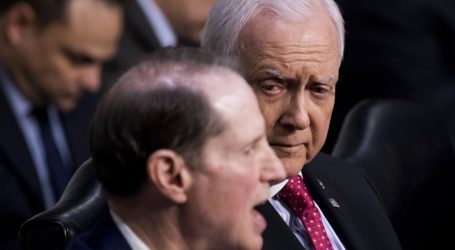January 6 Rioter Derrick Evans Could Return to the Capitol—as a Congressman
Mother Jones illustration; Will Price/West Virginia Legislative Photography/AP; Courtesy DOJ
Fight disinformation: Sign up for the free Mother Jones Daily newsletter and follow the news that matters.Derrick Evans had served only 37 days as a freshman West Virginia state legislator when he livestreamed himself storming the US Capitol on January 6. “Derrick Evans is in the Capitol!” he yelled, after pushing his way into the building with the mob. He was soon arrested, and in February 2022, he pleaded guilty to a felony count of obstructing law enforcement during a civil disorder. He was sentenced to three months in prison. During his sentencing hearing, Evans appeared contrite. “I will forever bear the reminder that I made a crucial mistake,” Evans told the judge. “I’ve let down myself, I’ve let down my community and, most importantly, I’ve let down my family.”
The next day, he went on a West Virginia radio show and disowned it all. “I’m never going to regret standing up to tyranny and standing up for the people who believe in me and standing up for the future of my children,” he said when asked if he regretted going to the Capitol.
On the second anniversary of the Capitol riot, just over two months after he left prison, Evans announced he would be running for Congress in West Virginia against his fellow Republican, incumbent Rep. Carol Miller. “I chose today to announce my bid for the House of Representatives because it is an important anniversary in US history,” Evans said in a statement. “While my name will indelibly be part of it, we should also use [it] as a chance to remind ourselves about why democracy is so important and how easily it can be threatened.”
Evans is a well-known crank in West Virginia, known for his involvement in the Stop the Steal movement and his years spent harassing Black Lives Matter protesters and clinic escorts and patients outside the state’s lone abortion clinic in Charleston. No one seemed to think the 39-year-old challenger could bump off Miller, who is facing no other primary opponents. A bison farmer whose family owns a chain of auto dealerships, she hails from one of a small number of wealthy families that now dominate the state’s insular politics. Her son, Chris Miller, is currently running for governor, and her father, Samuel Devine, was a member of Congress from Ohio, just over the border.
But as the May 14 GOP primary fast approaches, Evans seems to be making a surprising amount of headway. “I think the race has the chance to define what is the rightward boundary of where West Virginia has gone,” says Chris Regan, a former vice chair of the state Democratic Party. “Is there such a thing as too far right?”
Evans’ campaign has the potential to put Congress in a difficult position. The Constitution bars former elected officials who participated in an insurrection from holding federal office. But only Congress can enforce the provision. If Evans wins the race, Congress will have to decide whether to respect the will of the voters of West Virginia or enforce the 14th Amendment’s prohibition on seating an insurrectionist.
There’s not much public polling on the race, but in October, the WV Statewide News Poll showed that 10 months after Evans entered the race, Miller’s support had cratered from above 80 percent to below 55 percent, while Evans had crept up to 44 percent.
Evans seems as devoted to campaigning for office as he once was in harassing abortion clinic volunteers. (One had to get a restraining order against him in 2019 in which she accused him of stalking her.) He’s secured endorsements from MAGA luminaries like Michael Flynn, Roger Stone, Kyle Rittenhouse, and House Freedom Caucus Chair Rep. Bob Good (R-W.Va.).
In June, he traveled to former President Donald Trump’s golf club in Bedminster, New Jersey, to speak, along with Trump, at a fundraiser for the Patriot Freedom Project. The controversial charity provides financial support to January 6 defendants, but some lawmakers have called for the IRS to investigate the group for its political support for the former president. (As a 501(c)(3) nonprofit, Patriot Freedom Project is prohibited from endorsing candidates.) After Evans spoke, MyPillow guy Mike Lindell officially endorsed him.
Courtesy of the Evans Campaign
During one of his regular appearances on right-wing media, including Steve Bannon’s War Room, Evans recently accused Miller of refusing to debate him. “She’s currently hiding in the basement with Joe Biden,” he told Bannon. Evans’ hyperbolic assessment isn’t far off. Miller’s campaign has been decidedly lackluster. As of April 30, her campaign’s X account showed only two new posts since 2022. Her campaign website features ads that focus on Democrat Richard Ojeda, who challenged her in 2022.
On War Room, Evans also accused Miller of running misleading campaign ads that suggest she’s Trump’s preferred candidate. Miller has not endorsed Trump in the presidential race, and, perhaps unsurprisingly, he has not endorsed her either. When I asked Miller’s campaign about Evans’ comments, Matthew Donnellan, Miller’s chief of staff, responded, “I don’t think too many of our primary (or general) voters are Mother Jones readers so probably best to pass on the story.”
Besieged GOP incumbent Rep. Carol Miller has cut a campaign ad featuring mashed up videos and sound bites to give voters the totally fraudulent illusion that she’s been endorsed by President Trump in her WV-1 re-election campaign. pic.twitter.com/N1O3akQ54h
— Frankie Stockes (@realStockes) April 27, 2024
As an incumbent member of Congress and a member of the powerful House Ways and Means Committee, Miller has a built-in financial advantage. Of the nearly $1 million she has raised, more than $600,000 has come from corporate PACs. Only about $66,000 of her contributions come from inside West Virginia.
For his part, Evans does have a few big donors, like Taco Bell heir Kathleen Bell Flynn and her husband Steven Bell. (The Bell Charitable Foundation has also donated hundreds of thousands of dollars to the #Walkaway Foundation, founded by another January 6 defendant, Brandon Straka, who frequently appears with Evans at events.) In addition, Evans has been able to tap into the national MAGA small donor network. He’s raised more than half a million dollars from people giving $200 or less. Noel Fritsch, Evans’ campaign consultant, told me that Evans has outraised Miller in the past two quarters.
“She voted to fund the expansion of abortion in Obamacare. She voted to approve red flag laws,” Fritsch says, as evidence that Miller is out of touch with West Virginia voters. “She’s even palling around with Bill Gates in the state, and he has said he wants to end coal as an energy source.”
Miller is also taking hits from her son’s race for governor. Last month, the conservative Club for Growth Action, which is backing Attorney General Patrick Morrisey for governor, launched an onslaught of ads against Chris Miller that identified him as the son of the congresswoman. The ads bash him for taking $3 million in PPP loans for the family’s car dealerships during the pandemic—taxpayer-funded loans that were forgiven in 2021. The ads point out that Carol Miller had voted in favor of the legislation creating the loan program, and that Chris Miller has loaned his campaign $3 million—almost exactly the amount of the PPP loans.
West Virginia’s 1st District was redrawn after the 2020 census showed the state’s population had declined to such an extent it would lose one of its three members of Congress. This year’s election will be the first congressional race with the new boundaries, a fact that Fritsch believes will help Evans. He says many of the voters in the new district aren’t that familiar with Miller, who hasn’t had a serious challenger since 2018.
What about his conviction for his role in the insurrection at the Capitol? Could that be a political liability? Fritsch says no. In West Virginia “80 percent of the voting electorate thinks that whatever happened on January 6 was warranted,” says Fritsch, “and 70 percent think the feds did it.” (Polls back him up on some of this.)
Voters in West Virginia have an unenviable choice ahead. The election will likely be decided in the GOP primary, as the state’s Democratic Party has all but collapsed over the past decade. While Evans was storming the Capitol on January 6, Miller was sheltering in the House, fearing the angry mob. Once Congress came back into session, she remained loyal to Trump and voted against certifying the election.
At the same time, Miller has voted to keep the government open and supported aid to Ukraine and Israel. She’s a member of the Congressional Mental Health Caucus and has been amenable to working across the aisle once in a while, such as co-sponsoring a bill this year with Rep. Raúl Grijalva (D-Ariz.) and Rep. Yadira Caraveo (D-Colo.) to improve rural health care by bringing more doctors to rural areas.
In contrast, Evans seems mostly bent on burning it all down. When I asked Fritsch what sort of proactive things his candidate might do if elected, he replied, “We’d like to see a Nuremberg 2.0 military tribunal for all of those who were involved with the Department of Defense that deployed bioweapons that killed millions or more across the world.” I asked him to clarify exactly which “bioweapons” he meant. “The MRNA vaccines,” he said. “It would be good to have accountability for crimes against humanity for that.”
Regan suspects that Miller will probably hang onto her seat, given that this year, none of the major Republican candidates in other races for Senate or governor are veering as far right as Evans. “That going around talking about January 6 hostages is not the key to victory in West Virginia is a slim piece of good news,” he says with a laugh.
Evans’ campaign highlights a glaring disconnect in how the law treats candidates who’ve participated in an insurrection. West Virginia law bars Evans from running for his old seat in the state legislature. He can’t even own a gun because of his felony conviction—a handicap, Regan says, in a state where candidates are usually required to shoot at something in a TV ad.
Courtesy of the Evans Campaign
Many lawyers think he should be barred from running for Congress, too. Section 3 of the 14th Amendment, a Reconstruction-era provision, prohibits anyone who took an oath to uphold the Constitution, such as state legislators like Evans, from serving in federal office if they “engaged in insurrection.” Donald Sherman, executive director of Citizens for Responsibility and Ethics in Washington (CREW), says the state should not have allowed Evans on the ballot at all, but no one filed a legal challenge. “I think he didn’t look like a contender a year ago when he announced,” Sherman said. “He might have flown under the radar for some folks.”
Now, only Congress can decide whether Evans could join their ranks, thanks to the March US Supreme Court decision in Trump v. Anderson, which held that Colorado could not take Trump off the ballot because of his involvement in January 6. The court said that the states cannot enforce Section 3 against federal candidates; only Congress can. “There are not that many people with a stronger case for disqualification under Section 3 than Mr. Evans,” Sherman said. “I think ultimately if he prevails it will come down to whether Congress will enforce the provision of the Constitution against an insurrectionist.”




